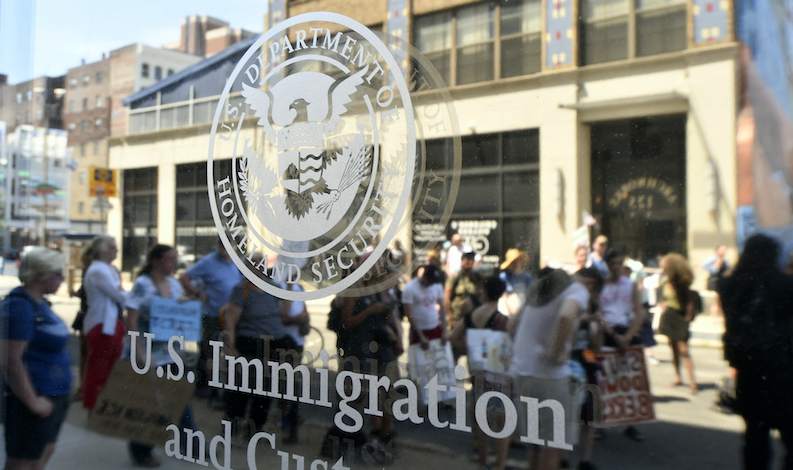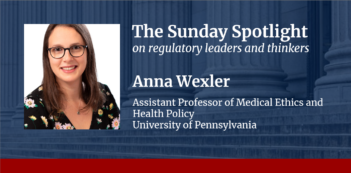
Scholar calls for increased protections for noncitizens within the health care system.
An undocumented pregnant woman arrives at a health clinic for prenatal care and sees Immigration and Customs Enforcement (ICE) officers in the parking lot. Does she go inside?
Too often, the answer is “no,” according to Medha D. Makhlouf of Penn State Dickinson Law. In a recent article, Makhlouf argues that fear of immigration enforcement deters noncitizens from seeking necessary medical care. This threat of surveillance harms the health care system, the health of individual noncitizens, and the health of the public.
Makhlouf attributes fears of immigration surveillance within the health care system to gaps and uncertainties in existing legal protections.
One such protection comes in the form of ICE and U.S. Customs and Border Protection (CBP) policies that limit enforcement activities at “sensitive locations,” such as hospitals and urgent care facilities. Makhlouf warns, however, that the scope of these policies remains unclear. Pharmacies, health fairs, and COVID-19 testing sites may not be covered. Moreover, immigration enforcement actions can also still occur near sensitive locations. In one instance, ICE officials arrested an undocumented teenager at a bus stop just outside a hospital after watching him leave the facility.
The ICE and CBP policies also contain multiple exceptions, subject to the discretion of immigration officers. Neither policy applies when officers determine “exigent circumstances” exist. In addition, the CBP policy does not apply to sensitive locations that “bear nexus to” the U.S. border, potentially excepting thousands of miles from coverage. And when local law enforcement officers partner with ICE to act as immigration enforcement agents, their actions are not subject to the same restrictions.
Because the sensitive location policies are contained in guidance documents, noncitizens who are arrested in violation of the policies have no legal recourse. The agencies can also modify or rescind the policies at any time without notice. With such shoddy protections, Makhlouf contends that undocumented persons’ fear of immigration surveillance within the health care system is justified.
Still, in other contexts, fears are greater than warranted, Makhlouf argues. She explains that many noncitizens worry that their health care provider will disclose their immigration status to legal authorities. Makhlouf contends, however, that the Health Insurance Portability and Accountability Act protects immigration status contained in medical records. Even when health care providers receive subpoenas from ICE officers, they have no obligation to disclose protected patient information.
Similar concerns about publicly funded health care programs are also misplaced, Makhlouf claims. Both Medicaid and the Children’s Health Insurance Program require applicants to provide their citizenship or immigration status, but federal law prohibits the agencies that administer these programs from sharing an applicant’s information for any reason outside program administration.
These privacy protections do not mean, however, that participation in publicly funded health care programs is without risk for undocumented individuals. Noncitizens seeking to secure lawful permanent resident status may be denied if they are considered a “public charge”—meaning someone who is dependent on the U.S. government for support.
In 2019, the Trump Administration expanded the scope of the public charge analysis to include participation in Medicaid, which led to a sharp decline in immigrant enrollment in this major health care program. Makhlouf explains that confusion about the new rule was widespread, leading to a lack of clarity on who was subject to the rule and which benefits were considered. Noncitizen enrollment in the Children’s Health Insurance Program—which was not added to the public charge analysis—also decreased in the wake of the new rule
Although the Biden Administration has since rescinded the Trump Administration’s public charge rule, depressed enrollment among noncitizens is expected to linger.
Makhlouf warns that decreased use of health care services and programs by noncitizens can have serious consequences. When noncitizens choose to delay or forgo necessary care due to fears of immigration enforcement, they risk severe illness and injury. These decisions can be life or death; Makhlouf recounts the story of one noncitizen who declined life-saving cancer treatment due to fears of deportation.
Moreover, the consequences from fear of seeking medical care can go beyond those suffered by individual noncitizens. Makhlouf contends that the immigration threats surrounding health care have deterred many noncitizens from seeking out COVID-19 testing and vaccination, hindering attempts to reach herd immunity. She warns that public health responses to other infectious diseases, such as measles, may similarly be frustrated.
In addition, when noncitizens forgo preventative care, severe illnesses can go undetected. The delayed treatment is often less successful and more expensive, driving up health care costs across the entire system.
Given these consequences, Makhlouf calls on federal legislators to create what she refers to as “health care sanctuaries” that would limit immigration surveillance in health care. She urges the U.S. Congress to pass the Protecting Sensitive Locations Act, which would codify and strengthen limits on immigration enforcement at health care facilities. She also recommends that the Biden Administration create an immigrant health task force to coordinate actions between multiple agencies and balance competing immigration and health policy concerns.
Makhlouf warns that it might take years to rebuild trust with noncitizen communities following the Trump Administration’s heightened immigration enforcement efforts. Creating durable protections against immigration surveillance within the health care system would be an important first step, she concludes.



